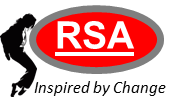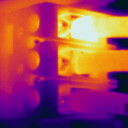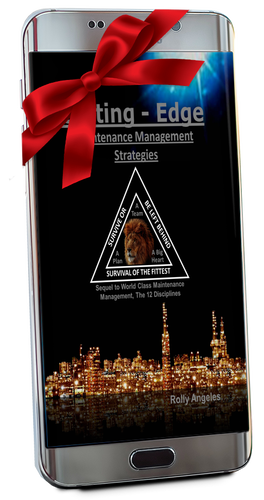

RSA Online E-Book Store
These books are written for maintenance people in industries seeking better ways of improving their equipment and assets. If you are living the day to day pressures of doing maintenance, then these books are written for you.
My Mission
Cutting Edge Maintenance Management Strategies (E-book Readable Version)
This is the 4th of a series of books on World Class Maintenance Management covering these cutting-edge maintenance management strategies. This book also explains the deeper meaning of reliability and why achieving world-class reliability is more challenging than achieving a world-class maintenance level. Every industry needs to survive its business and competition by applying the correct maintenance and reliability practices to its equipment and assets. Here are just some of the highlights of this book:
- Why Maintenance Cannot Improve Reliability
- Changing the Maintenance Culture
- The Concept of Life Cycle for Industries
- The Importance of Life Cycle Costing in the Reliability Strategy
- The Concept of Early Equipment Management
- Cost Cutting the Wrong Way to Save on Maintenance Costs
- From World Class Maintenance to World Class Reliability
- The Need for a Structured Asset Management System ISO 55001
- Extending the Life Cycle of Equipment
- Can Failures and Breakdowns be Totally Eliminated?
- Why Reliability is Everybody's Responsibility
- Precision Maintenance Explained
- Requirements for Precision Maintenance
- Other Applications of Precision Maintenance
- Why are Operators Important in the Reliability Strategy?
- What Empowerment can do to Operators?
- Selecting the Correct Interval for Maintenance Tasks
- The Need for Spare Parts Management
- The Most Important KPI in the Storeroom
- Step-by-Step Activities to Improve your Storeroom
- Point by Point Comparison between RCM and TPM
- Requirements for TPM JIPM Certification
- Are Industries Ready for Maintenance 4.0?
- Reliability in All its Simplicity is Difficult but Possible to Achieve
When I first published my first book on World Class Maintenance Management, the 12 Disciplines, in 2009, I thought I have written everything to achieve a level of World-Class Maintenance Management. Industries must understand that having World Class Maintenance is very different from achieving World-Class Reliability and why the latter is much difficult to achieve. There are also many developments and changes today in maintenance that we need to adopt. Writing this book is not only for the readers to understand the new trends in maintenance but also for them to understand the reason for using them. These strategies must be adopted by industries for their own advantage because, in today's phase, the law of the jungle applies, and that is, survive now or be left behind. What makes this book special is two of the people I admired most in maintenance are part of this book. Mr. Joel Levitt, a veteran from maintenance and book author, has written a book review, and my dear friend, the Godfather, R.Keith Mobley, for writing the foreword message of this book. These are two of the people I admired and respect in the field of reliability and maintenance. This book contains 15 Chapters. This book is not only a sequel to my other books, but it is also an enhancement of my previous books. Industries must accept that they cannot remain reactive forever, and much can be done to improve the maintenance function. I have also explained why it is important for c-level people in any industry to adopt these cutting-edge maintenance strategies for their benefit, why it should be done, and their role.
Rolly, your people-focus on reliability improvement and your commitment to helping people grow through improving their understanding of equipment and of themselves come through loud and clear in the book. The workplace stories you tell will resonate with people working in operations and maintenance in every industry. I very much like that you have provided practical answers with explanations and examples of how companies can move up the path to world-class maintenance performance. You have written about TPM, RCM, and RCA with great passion and an obvious depth of knowledge and experience. I’ve learned much more about the right way to use those tools by reading your book than I ever understood before. There is no doubt that the World Class Maintenance Management - The 12 Disciplines book will become a well-thumbed reference book for me. Rolly, I’ve been fortunate to come across you and value your honest perspectives and insights on doing maintenance right. I share your desires for what maintenance can become and do for a company and hope that we can combine our efforts in the future.

This new book published in May 2020 is by far the most comprehensive maintenance management book written to date. That includes my Handbook of Maintenance Management. In 344 pages he lays out the history of maintenance management and the state of the art today. Rolly has deep experience and understanding in both RCM and TPM (an unusual combination) which adds depth to the discussion. He includes a detailed and practical glossary of keywords and their meanings. I want to make a few specific points. The assessment tool is great, and I will definitely upgrade my own assessment tool with his improvements. It covers all aspects of managing maintenance. Asset management: This is one of the best introductions to asset management and detailed rundown of ISO 5500X I've read. It shows through examples of how asset management can help the organization's effectiveness. Life cycle management is certainly part of asset management. In this case, the life cycle discussion shows definitively how most of the reliability is not under the control of the maintenance function. He says that reliability is a company's responsibility. Good graphics on the iceberg of costs to own and run a machine. Good maintenance practices may require a change in the corporation. The section on change management is well thought out and complete. Congratulations on publishing what will become the standard text in the field.

This book contains significant and relevant theory and idealism. I never read this kind of book before but it hits the core value of TPM. It is indeed maintenance quite necessary in any kind of manufacturing company. I salute for all technicalities which I don’t know it comes from before, I have learned a lot from this book. As technical personnel, I can say that it’s very much informative and vibrant. It makes a lot of sense in dealing with the alternative way of maintenance. All throughout, I was amazed by the author’s knowledge. Proud being a Filipino. Thank you for sharing this kind of book with us the author is really a mastermind on this TPM world. I absolutely enjoyed reading it even though I’m not really a reading enthusiast. I miss the Rolling Stone part which you gave the color on this book. Kudos Mr. Rolly Angeles for a good job. I now truly understand and felt being one of the maintenance team. This book has a heart and is very lively. I hope you continue to spread the meaningful story of the maintenance people. We owe you all the knowledge and being a part of this team review. Congratulations Mr. Rolly this is a heck of success. Thank you.

First I want to thank you Mr. Rolly for giving me this very rare opportunity to comment in a book and have my comment in print. At first, I was wondering where would this book lead me? Your quote “changing a system means changing a culture” captured my attention. So as I read, I already knew I need to finish reading this book. I can relate to most of what was illustrated, stated, and example in this book. They’re all true and happening. A reality. I dreamed of having a kind of maintenance organization such as those described. My only worry is that I am not in the position to implement such. It is true that this kind of approach should be top to bottom, no support from upper management means you’ll end up to nothing. I am a maintenance guy and proud to be one. But it is great to know somebody that dedicates too much time and adheres to improve the lives of maintenance people like Rolly Angeles.

The Author

Rolly Angeles
store owner
Rolly is a seasoned international maintenance and reliability consultant with over 30 years of solid experience in the field. He has been invited to different countries and has conducted reliability and maintenance training in United Arab Emirates, Qatar, India, Malaysia, Indonesia, Brunei, Thailand, Nigeria, Bangladesh, South Africa, China, and Botswana. His portfolio of maintenance training includes maintenance and reliability courses on TPM, Lubrication, Tribology, Condition-Based Maintenance, RCM, RCFA, Planned Maintenance, World Class Maintenance Management, The 12 Disciplines, Oil Contamination Control, Maintenance Indices and KPI’s, Maintenance and Reliability Management Strategies and much more. Rolly previously worked with Amkor Technology Philippines, as a TPM Senior Engineer, an industry engaged in the manufacture of Integrated Circuit products and spearheaded their Planned Maintenance organization which composed of maintenance managers and engineers.
With 30 years of solid experience, he had worked in various industries from shipping, woodworking, foundry, cast-iron machining, assembly lines, semiconductor manufacturing, and mining industry. Here was where he gained hands-on experience and understanding of both TPM and RCM respectively, a strategy from both the west and the east. His last corporate employment was in 2002 where he worked as a technical training specialist at Lepanto Consolidated Mining Industry. In 2005, Rolly retired early from the industry and decided to establish his own consulting business, RSA Reliability and Maintenance Consultancy Firm where he dedicates his time and passion to work as a maintenance consultant. He provides in-house training, consultation, and facilitation to different industries on maintenance and reliability’s best practices.
